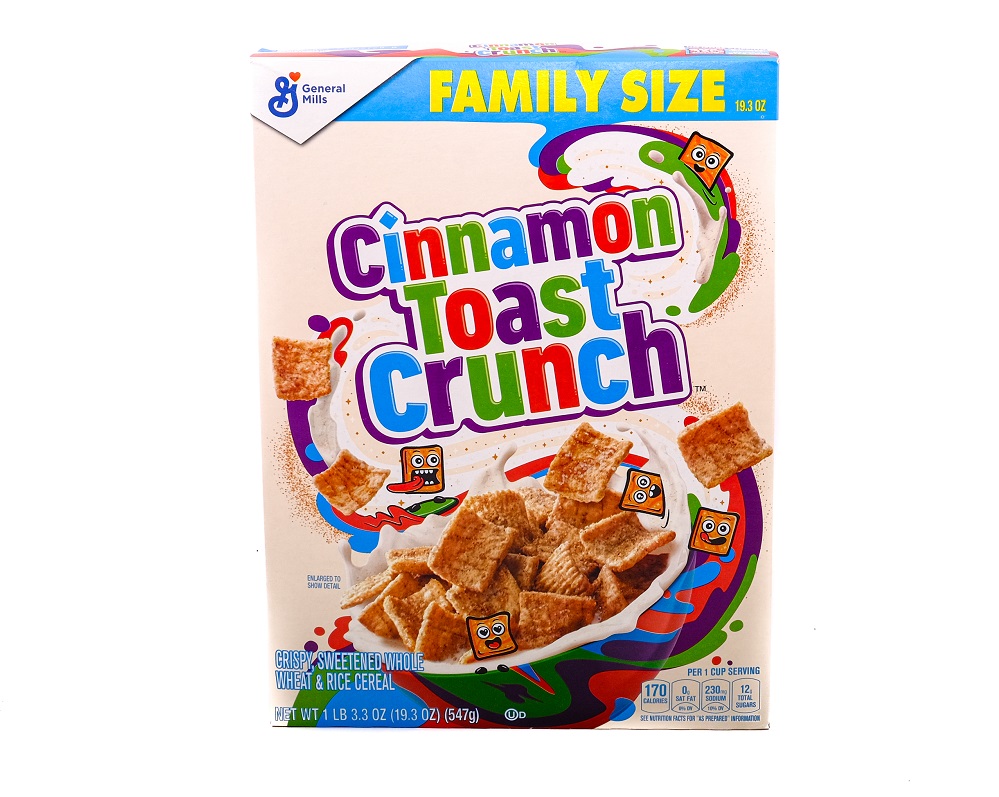First produced in 1984, Cinnamon Toast Crunch is a breakfast cereal brand produced by General Mills, a large company that is also responsible for other cereal brands such as Cheerios, Cocoa Puffs, Cookie Crisp, and Count Chocula. In a previous survey done, Cinnamon Toast Crunch was listed as the fifth favorite cereal by over a thousand respondents (1).
Since Cinnamon Toast Crunch is fortified with vitamin D3, it is highly debatable if whether the cinnamon cereal brand is truly vegan. Many vegans feel very strongly that food fortified with any form of vitamin D cannot be vegan since this vitamin is predominantly produced using animal products. However, not taking the vitamin into consideration, Cinnamon Toast Crunch appears to be devoid of any other blatantly non-vegan ingredient.

Like other breakfast cereal brands, Cinnamon Toast Crunch is mostly made of grain and sweeteners. Unlike other cereal products, Cinnamon Toast Crunch does not contain natural flavors since it derives most of its flavor appeal from cinnamon which is a perfectly vegan ingredient as it is obtained from the bark of Cinnamomum trees.
Unfortunately, just like other breakfast cereal brands, Cinnamon Toast Crunch is fortified with vitamins and minerals. The problem with vegans is the presence of vitamin D in Cinnamon Toast Crunch. Although vitamin D can be industrially produced through vegan means, it is believed that the vitamin is mostly made using an animal product today. Specifically, assessments place that vitamin D is mostly derived from sheep’s wool.
Due to the presence of vitamin D, many claim that Cinnamon Toast Crunch cannot be considered truly vegan.
The list of ingredients of Cinnamon Toast Crunch includes (2): whole grain wheat, sugar, rice four, canola oil, fructose, maltodextrin, dextrose, salt, cinnamon, trisodium phosphate, soy lecithin, caramel color, BHT added to preserve freshness.
Vitamins and minerals: calcium carbonate, iron and zinc (mineral nutrients), vitamin C (sodium ascorbate), a B vitamin (niacinamide), vitamin B6 (pyridoxine hydrochloride), vitamin B2 (riboflavin), vitamin B1 (thiamin mononitrate), vitamin A (palmitate), a B vitamin (folic acid), vitamin B12, vitamin D3.
As evident from the ingredients listed above, Cinnamon Toast Crunch is perfectly suitable for vegans as the cereal brand does not contain any obvious animal product or derivative.
Furthermore, Cinnamon Toast Crunch is densely packed with a wide variety of vitamins and minerals. Particularly, the cinnamon cereal brand serves as a good source of vitamins that vegans do not typically have access to such as vitamin B12 and vitamin B2. These are vitamins that people typically obtain from food sources that vegans avoid such as meat, poultry, seafood, eggs, and so on.
Sugar, also known as sucrose, is among the most common sweeteners used in the food and beverage industry. Sugar is conventionally obtained from plant sources like sugarcane or sugar beets. Despite the nature of its source, there are some vegans that are not comfortable with sugar due to some possible circumstances surrounding its manufacture.
Many sugar companies subject their sugar to additional refinement processes to make them more appealing to consumers. These additional refinement processes make sugar whiter and finer. One such process used for further refinement includes filtration. Different companies use different filtration methods. However, the problem is that some companies use bone char for filtration. Bone char is the charred skeletal remains of different animals (3).
Serving as an effective filter, some sugar companies use this material to filter their sugar. Unfortunately, sugar produced this way can no longer be considered vegan since an animal product is involved.
Another problem with the use of bone char in the sugar industry is that not all sugar companies use them. This makes it difficult to determine which ones to avoid. Furthermore, large food manufacturers usually require significantly large amounts of sugar which means they could possibly have multiple sources of sugar. This makes it even more difficult to ascertain if whether the sugar used in a food product is vegan or not. The uncertain vegan status of sugar makes it a gray area ingredient.
Fortunately, this is not a global issue since the practice of using bone char is more prevalent in the US. Thus, vegans in other parts of the world are not as wary of sugar compared to vegans in the US.
Compared to macronutrients (i.e., carbohydrates, lipids, and fats) that have to be consumed in large amounts, micronutrients such as vitamins are only needed in minuscule amounts. The human body requires different kinds of vitamins for proper bodily functions, but there is a vitamin that some vegans are wary of: vitamin D.
While most vitamins needed by the body are acquired through diet, vitamin D is unique in the sense that the human body can produce it with the help of UV radiation from the sun. However, many food companies fortify their products with various vitamins and minerals including vitamin D.
The problem with vitamin D is that it has a long history of being industrially produced using animal sources. For example, vitamin D used to be extracted from animal spinal cords and brains. However, that practice became expensive and uneconomical. These days, it is believed that the majority of commercial vitamin D comes from sheep’s wool. Industrially, a cholesterol is derived from the sheep wool that is then converted to active forms of vitamin D (4).
However, there have been advancements in the synthetic production of vitamin D that do not utilize animal products. Other reports mention that some companies are looking into biotechnology to produce vitamin D with the help of lichen. Unfortunately, it is difficult to determine if whether the vitamin D used in fortified food products is indeed vegan or not. Thus, it is for the consumer’s discretion if whether they would consider Cinnamon Toast Crunch to be truly vegan as it contains vitamin D3.
References
1. https://www.bestseocompanies.com/
